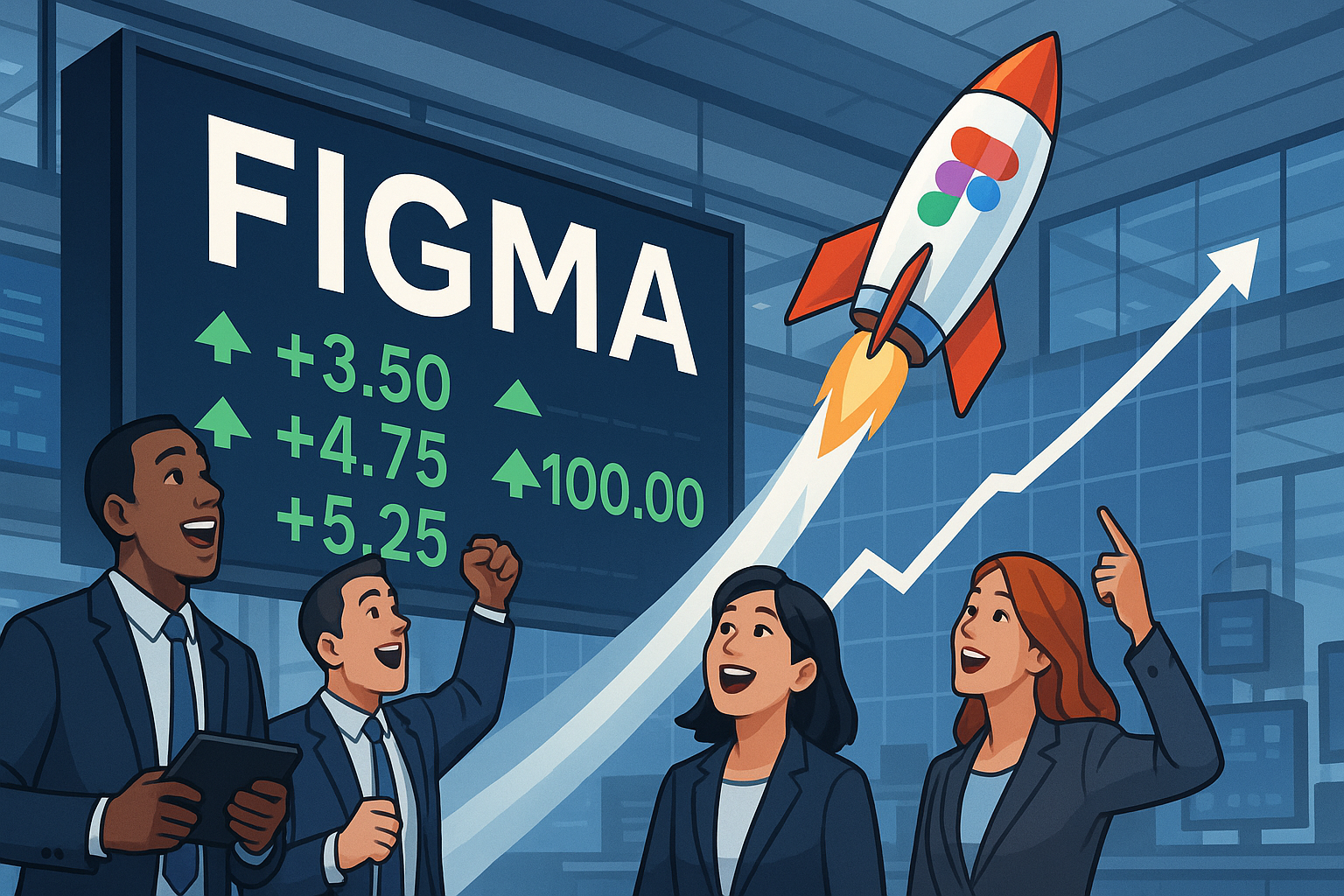Figma shares are soaring to a stratospheric $95-100 range according to CNBC's latest reporting, catapulting the design software company to a jaw-dropping $59 billion valuation. That's billion—with a 'b'—roughly triple what Adobe offered before regulators mercifully intervened to prevent what now looks like would've been the bargain of the century.
I've covered more IPO pops than I can count over two decades in financial journalism, but this one? This one hits different. We're witnessing a potential 200% first-day surge from the already-increased $33 IPO price. At $100 per share, Figma would be commanding approximately 65 times its trailing revenue. For those keeping score at home, that's not merely expensive—that's "I'd like to purchase Jupiter as my summer home" expensive.
The irony is absolutely delicious. When antitrust regulators blocked Adobe's $20 billion acquisition attempt last year, Adobe executives must have been furious. Now? They're probably sitting in a dark room somewhere, wondering how they missed the additional $39 billion in value that public investors apparently see clear as day. Talk about regulatory intervention accidentally creating shareholder value!
What's behind this frenzied reception? Classic supply-demand imbalance on steroids. Sources tell me the offering was oversubscribed by a factor of 40—meaning demand outstripped available shares by 40 to 1. That's Taylor Swift ticket drop territory. The auction-style pricing mechanism, where investors had to specify their price appetite and allocation desires, only amplified this pressure cooker effect.
Let's put some cold, hard numbers on the table. Figma generated $228 million in revenue last quarter. Impressive? Absolutely. But—and this is a big but—the company also reported a $732 million net loss for 2023. At a $59 billion valuation, we're talking about investors paying over 60 times annualized revenue for a business that's currently hemorrhaging cash despite its undeniably impressive growth trajectory.
Look, nobody's questioning whether Figma is building something valuable. By all accounts, they've created a revolutionary product that designers would sooner give up caffeine than abandon. The question is whether any software company pulling in $900 million annually deserves a $59 billion price tag. For context, Salesforce trades around 7 times revenue, while Adobe hovers near 11 times.
"This is what happens when you starve growth investors of new names for two years then dangle a genuinely good company in front of them," one veteran IPO investor told me yesterday, requesting anonymity to speak candidly. I've seen this movie before—hunger makes for poor judgment at the dinner table.
Meanwhile, CEO Dylan Field—the Thiel Fellowship dropout who built this design juggernaut—will maintain a staggering 74.1% voting control through supervoting shares. Not bad for someone who decided college wasn't his thing. He's now running a public company valued at nearly $60 billion. I remember covering tech wunderkinds back in the early 2000s, and even by those standards, this is an extraordinary concentration of power.
The broader implications for the IPO market are fascinating. Does Figma's spectacular debut pry open the floodgates for other tech offerings? Will we see companies rushing to file S-1s to capitalize on this apparent appetite? History suggests yes, but... timing markets has ruined more careers than bad investments.
For investors jumping in at these levels, the math is daunting (to put it mildly). To justify a $59 billion valuation long-term, Figma needs to grow into a substantially larger business. Can its collaborative design platform become as ubiquitous as PowerPoint or Excel? That's essentially the bet being placed today.
The company does have impressive adoption beyond its designer core. Software developers, product managers, and marketers increasingly rely on Figma's collaborative capabilities. And AI integration could certainly expand its reach. But the gap between current business reality and market expectations? It's Grand Canyon-wide.
For now, Figma's IPO serves as a reminder that in markets, price and value can diverge wildly—sometimes embarrassingly so. Whether this divergence represents temporary euphoria or the dawn of a new valuation paradigm for software companies remains to be seen.
At $95-100 per share, one thing is crystal clear: investors are paying for a future that's still very much a work in progress. Or, perhaps more appropriately for a design tool company, a sketch still being refined.
